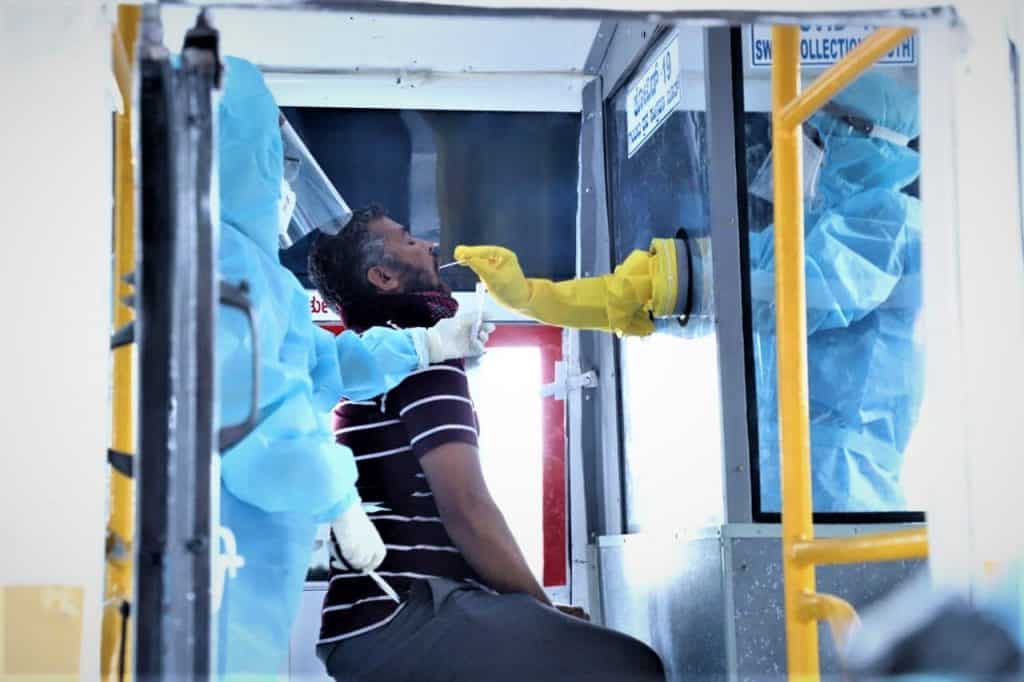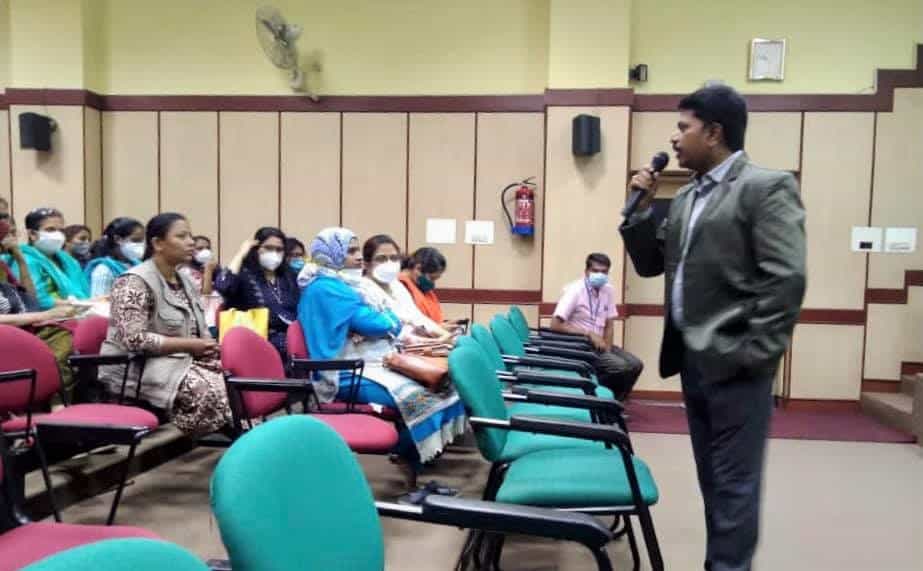In Part 1 of this series, we saw how the anxiety, financial loss, lifestyle changes and death, brought on by COVID, is having an effect on the mental health of citizens. In this concluding part, we explore how to cope with what could be a mental health crisis.
A 37-year-old software engineer with a major IT company says, “As a mother, I’m under a lot of stress. Everyone is under stress during the lockdown, but I can’t vent out or get upset because I have to prioritise the mental health of my 7-year-old daughter who is also stressed.”
She is referring to the mental health resources shared by her company. “I practise mindfulness and relaxation techniques as mentioned in these materials. To some extent, this has helped me stay calm. Another thing that helped was: communicating with higher-ups in my company about my current limitations; they have been supportive.”
Someone to talk to
While a few companies were quick to implement counselling for their employees when work-from-home became the norm, the larger population had to find help on its own.
Several mental health helplines have been active in Bengaluru since the start of the pandemic. Dr Vikram Arunachalam, Consultant Psychiatrist with the District Mental Health Programme (DMHP)-BBMP, says that their helplines have been handling 700-800 calls per day. They handle calls from all sections of society, mainly on issues like anxiety, depression, suicidal thoughts, sleep disorders and drug use.
Dr Vikram says, “We allow callers to ventilate their feelings. The majority feel reassured when we just listen to them empathetically. In 50% of the cases, we make follow-up calls. Only 5-10% of the callers need medication.
What the doctor prescribes, to keep stress and depression at bay:
- Staying connected: “We encourage people with mild stress and depression to talk to their loved ones in this period, and to share both happy and sad feelings.”
- Following a healthy lifestyle: “Techniques like deep breathing exercises help. Sleep is very essential in this period, and it’s important to follow sleep hygiene. We tell people to get adequate sleep before midnight because that is more rejuvenating for the body than sleeping the whole day. Also, people are hooked to their laptops and phones, so we talk to them about digital detox and becoming physically active (for example, by taking a brisk walk nearby while following social distancing rules). We also suggest following a healthy, balanced diet, and to stop smoking and excessive caffeine consumption. These measures will help improve their sleep at night, which will make them less anxious during the day.”
- Having a daily routine: “Since most people are locked up at home, we talk to them about having a consistent daily routine. Each individual needs to identify what activities they need to do everyday, resume the hobbies they had earlier, and set a specific time for each activity.”
- Limiting media consumption: “Some information is needed from reliable sources, but excessive consumption of COVID-related news induces anxiety. So people jump into catastrophic thinking – they think in extremes. Even when they get mild fever or cough, they worry if they will have to go to the ICU. So we try and make them think the opposite. We encourage them to look into things other than COVID.”

NIMHANS (National Institute of Mental Health and Neurosciences) had created brochures and videos on mental health effects of COVID on different populations, and how to cope. You can refer to those here. NIMHANS is also holding yoga sessions over Zoom, to help deal with COVID stress.
Government-initiated mental health helplines in Bengaluru
1) NIMHANS helpline: 080-4611 0007
2) DMHP-BBMP helplines
3) Support for patients in home isolation. “GoK’s StepOne team of volunteers call up those under home isolation to check their health status and give advice. If the patient wants to talk to a mental health professional, we have a dedicated mental health team along with 65 psychologists for this,” says Dr Rajni P, Deputy Director (Mental Health), GoK.
Despite the multitude of helplines, many Bengalureans don’t know where to seek help. Therapist Padmalatha Ravi says her clients have increased manifold compared to pre-COVID times but they weren’t aware of mental health helplines. Most of her clients are in their 20s. She suggests that, in the long term, authorities could perhaps organise mental health camps at the neighbourhood level regularly.
Handling COVID grief
COVID protocols have made it difficult to handle the grief of losing a loved one. For example, in case of the death of a COVID patient, the doctor can only call and inform the family.
Dr Suresh Bada Math of NIMHANS says, “Doctors don’t have the option of an in-person meeting with the family member, understand their situation, and speak to them over 30-40 minutes to break the bad news. But the news of death, when informed over a phone call, may come as a shock to the family member, and they may not be able to handle it. The person receiving the bad news could be a young person, a pregnant woman or someone with serious health issues, but the doctor won’t know this.”
Relatives and friends are unable to grieve together or do the final rituals of the deceased person either, which are essential for the grieving process, to heal. Watch Dr Suresh’s video about handling COVID grief here.
COVID protocols that don’t allow a family member to be with the hospitalised patient is another concern, says Dr Suresh. Many patients are unable to communicate with their families, which leads to a lot of stress. “Hopefully these protocols will change over time,” he says.
Mental health – Not enough help
Dr Vikram says that, in addition to operating the helplines, DMHP has also been involving PHCs in mental healthcare. “In the past five years, DMHP has been training PHC doctors and staff about common mental health issues. Psychotropic medicines are also available in PHCs. If people with pre-existing mental health issues or those who call our helplines need medicines, we take the help of PHC field staff to deliver these to their doorstep.”
Conversely, if the PHC doctors identify a visitor suffering stress, they will provide basic counselling; and if needed, reach out to DMHP. During COVID, DMHP has also focused on the homeless mentally ill, and frontline workers.

However, shortage of manpower is an issue, he points out. “Our team comprises only a psychiatrist, psychologist and psychiatric social worker, two nurses and four lay counsellors. We need more human resources to reach out to more people. NIMHANS or DMHP alone can’t do miracles. PHCs are also multitasking, so they can’t focus exclusively on mental health now.”
Last week, DMHP trained a city NGO to identify symptoms and provide counselling. The NGO will run their own helpline, and refer serious cases to DMHP. Dr Vikram says the only solution is to scale up this model: “Volunteers at NGOs can be trained over an online meeting for a day. We need to empower more people – NGOs and even the general public – to identify mental health issues.”
There is no such policy decision at the government level yet. However, the state government has been preparing a vision document for health which will cover various aspects including mental health, says a senior official on condition of anonymity.
Read More: Relieving epidemic-related stress through art
At the national level, there’s a plan to empower communities the way Dr Vikram envisions. Dr K Sekar, who heads the Centre for Psychosocial Support in Disaster Management at NIMHANS, says the centre has been quickly doing a virtual psychosocial first aid training for a large number of States, NGOs and others: “We are creating some master trainers, and asking them to train others in the community. For example, if we train 30 people, and they train 30 more, then 900 people are trained, and so on.”
Community as the mental health cushion
Dr Sekar says that in any disaster, the only answer is to involve the community. “The community should be empowered with the right information, help the person think positive and get out of the situation. Not only DMHP, even faith-based organisations, local NGOs and welfare associations need to look at what’s needed; the local community will welcome their support more.
For example, a neighbour can take better care of a child left alone at home, instead of putting the child in an institution which will be traumatic.” He says the National Disaster Management Authority (NDMA) is looking at a national strategy on how to deal with the grieving process as well.